Text
Not a ‘Clue’
Data; raw data that is specific to you as an individual is about as personal as it can get. Everybody has figures that represent their academic ability, their financial situation, their location, all of which are accessible to greater organisations such as the government, or our local council for qualitative data purposes, but what about the data that is collected that goes beyond surface level statistics?
Mobile technology is fantastic in what it enables us to do, but it is also a constant invasion of privacy. It is up to us as users as to how far we want to allow this to go - we have the ability to download certain applications free of choice. An app that is inbuilt to the iPhone is that of ‘Health’. Now, on this application it collects data every time you even move with your phone, counting each and every step that you take. I can tell you that when I went to London on Tuesday, I walked 18,980 steps which is a grand total of 14.2 km! This is information that I didn’t even know that I wanted, yet was still interested to see.
With the rise in popularity of the Fitbit, so comes even more personal data that is collected. If you connect the watch to the app, it will monitor your sleep, your calories, your well- being, your steps, how many stairs you’ve climbed and so on. This has been immensely useful in helping there to be a greater awareness of how vital it is to live a healthy lifestyle. The app can then be synced with other applications of the sort, where you can enter every single calorie that you eat. What’s even better is that these apps are FREE!
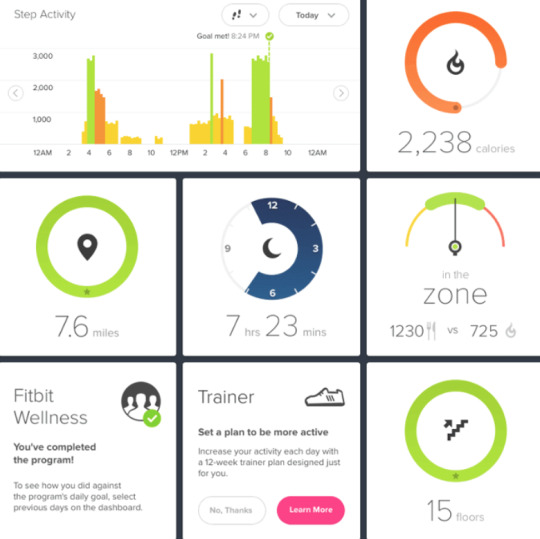
Downloading an app that can monitor your sleeping pattern can lead to a whole insight into how you can get a better quality of sleep – maybe you need to avoid setting an alarm for 7am as you are in fact in your deepest sleep at this point, maybe you are the most restless around 2am or maybe you simply struggle with the initial getting to sleep; but this app can help you!
As can the app ‘Clue’. For us women out there we know about the struggles that that ‘time of the month’ brings * sigh *– but we can use this app or the many like it, to keep track of our emotions throughout. After a while of inputting this data there will be a strong database of your mood cycles etc. The app can even tell you when you’re most likely to be fertile, which is deeply personal. The concept that simply from data that is entered, an app can tell you information that one would normally assume to reach out to a doctor for is surreal.
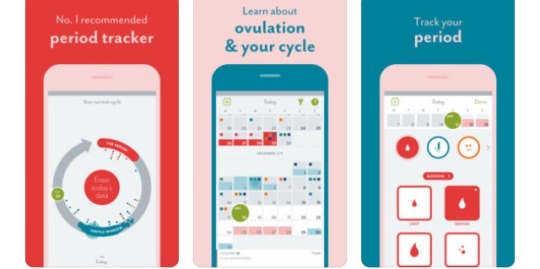
But the question is where does all of this personal data go? In a world of business, nothing is really ever free. For us as users, downloading a free app is great, but there must be a catch where the application creators also have to make a gain. Who sees the data that we put into our phones? It is the norm to rely on our phones to carry everything for us, it makes our life so much easier, but by doing so, who are we feeding such sensitive data to? I, for one, have not a clue.
It definitely is worth considering who we allow to access our data. Imagine how betrayed you would feel if you came home to find that your house had been burgled, someone having torn through every drawer of yours, every cupboard; each one of your possessions had been rifled through, even your most precious belongings. You would be distraught, so why, I ask, do we allow a stranger to rifle through our data just the same? Just because we can’t see it, doesn’t mean that it isn’t happening.
7 notes
·
View notes
Text
‘Generation Snowflake’
The concept of the millennial generation being too sensitive to any form of opinion expressed is referred to as the ‘snowflake generation’. It is a very accurate label for the rise of political correctness in today’s world. The freedom to be able to express your own stance towards any topical issue seems to have been stripped from us, with someone being more than likely to argue your point of view – if they don’t take every word you say to heart first.
Take for instance the story that circulated the internet about the children’s clothing advertisements for H&M. The advert contained a black child modelling a green hoodie with the slogan ‘Coolest monkey in the jungle’ across the front. Now, on surface level that’s a fun item of clothing for children to wear – children are always referred to for ‘monkeying around’, yet the internet slammed this as a PR disaster. The company was branded for being ‘racist’ and the advert itself labelled as ‘unacceptable’. If a white child had modelled this jumper, I do not believe that the internet would have gone into meltdown. For me, I think that this is a case where an innocent advert has been taken out of context and blown out of proportion into an issue bigger than it should have been. Yes, people may have been offended by it, but were they also reading far too deep into the meaning of the advertisement? Again, this is an issue that people will have their own opinions on, but I personally think that there were no malicious intentions behind this child’s advert.
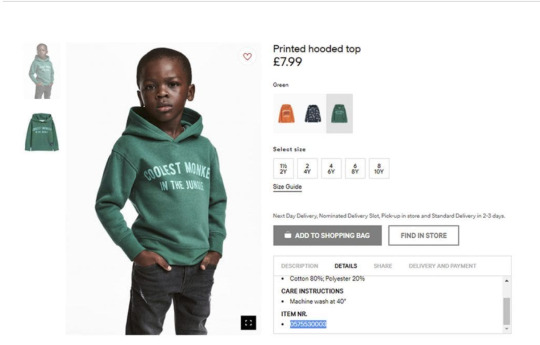
Another example of a recent PR disaster was by the travel company Thomas Cook. A woman aged twenty-one was told that she would be removed from the flight if she didn’t cover up. Obviously, the humiliation that this must have carried would have been enormous – you’re on the way to a sunny holiday destination with your best friends…and then you’re posed with the removal from the flight for wearing a lengthy pair of trousers and a crop top. She was bound to feel singled out and ridiculed in front of hundreds of people, so it is no wonder that this has become a news worthy story. The company clearly felt that this was an issue that would cause upset to some of their customers, but in a bid to please others, they have caused an issue that everyone on the internet seems to have an opinion on. This is an example of where there has been no right answer because it seems that so many people support the airline in what they did, yet so many people also support the woman – the general public do love a good debate; it’s almost as if reasons are being found simply for the sake of arguing.

In America, some schools set up a ‘holiday tree’ at Christmas, so as not to offend those who do not celebrate Christmas; Easter eggs have been named ‘spring spheres’; gingerbread men and being called ‘gingerbread people’. This is too far! It is totally understandable that brands don’t want to cause a scene or find themselves in a situation where they have to publicly apologise for an innocent mistake, but perhaps people need to stop being so critical of everything that they see or read.
There is an interesting TED Talk on the concept of ‘emotional correctness’ where it states that people should forget WHAT is said, but instead HOW it is said. The context of an advertisement will have a massive effect on how the message is interpreted. If someone outright states an opinion that clearly sends out a controversial message, then perhaps people will take offence, but people need to stop reading so far into a message that they end up becoming upset or offended by what they think they are being told.
6 notes
·
View notes
Text
‘Social’ Media
When we pick up our phones, more often that not, it is to communicate with someone. A phone’s sole purpose is to connect one another through the use of messages and calls. If we go way back to 1973 when the first mobile phone was created, it allowed for 30 minutes of calls, with a charge time of 10 hours. Just over 40 years later and we now have abilities far and wide on these devices; abilities that never would have been deemed possible a few decades ago.
It is expected that by 2021, nearly one third of the planet’s entire population will be a part of the online community. This social network provides so much interactivity, with almost every aspect of our lives being shared to those who engage with our online accounts. But the question that I want to ask is whether this phenomenon of a social network has made us as a society more social, or if it has in fact lessened our social abilities.
The first two contradicting arguments that spring to mind are the obvious – yes, they have made us more social as we connect with people at times that we can’t be with them; no, they have not made us more social - the addiction to the social network takes away from the moments that we do spend with people IRL.
But I want to go deeper than that, I want to explore why it connects us with people, solidifying friendships, and why it can also lead to the death of friendships. So, to begin…
The social network is a feature of the modern day that we can all access. We can access it from our phones, our tablets, our laptops, and even our watches it would now seem. With the development of smart watches where notifications can appear, the social network doesn’t just exist in something that we hold, but now it exists in an accessory that we wear. It is EVERYWHERE.
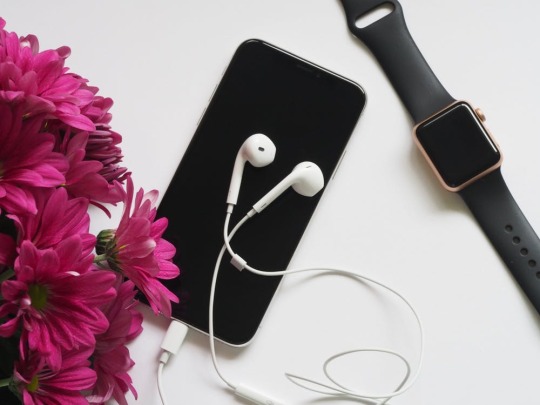
If you go to a shop and look at their posters in store, chances are they will have the handle to their social accounts readily available. Some companies even create their own hashtag to bring together their consumers under one discourse community: #babesofmissguided and #pltstyle are just two examples of a platform created for buyers of fashion clothing to come together to share their outfits. The hashtag #ootd is an internationally-used tag, whether it be by every day users, or by bloggers to share outfit inspiration - there are hashtags available to bring together a community of any size under an umbrella of common interest.
A social network extends beyond this – a social network allows for you to connect with your course mates about the latest assignment, it allows you to connect with your friends from home, your work colleagues, your family. It also allows you to connect with total strangers.
We all have group chats where we message multiple people simultaneously – it’s easy for convenience. Most students at uni I’m sure will also have a house group chat, I know I do. But why? I live with these people so I am guaranteed to see them. Why couldn’t I just save what I had to say until I saw them, rather than posting a message in the chat? It’s the immediacy.
Social media provides us with a platform to share news as soon as its happened. Gossip from Friday night? Of course, it has to be sent in voice notes to your course mates – it definitely can’t wait until Monday to be shared. We are now so used to receiving and giving news as soon as its happened that is a natural part of life. This is where Snapchat became so successful in the social media market.
The feature that Snapchat provides us all with is the ability to take a photo, or a video, of an exact moment in time. It saves us having to describe the amazing smoothie bowl that you had that morning at brunch, it saves you having to ring your friend from the shops and describe a dress to know whether to make the purchase or not and it saves the storage of your phone where photos disappear after 10 seconds! Its EASY. It makes our life a whole load simpler and that’s what we love. When life is busy, anything to help us save time is appreciated by all.
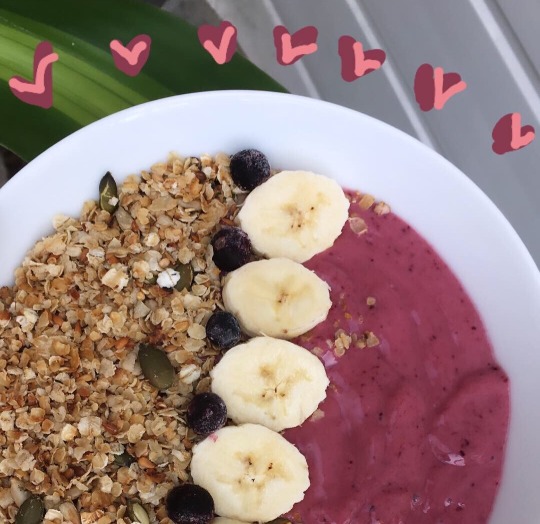
As I have grown up, I have seen the patterns of social media change. I first got Facebook at the age of thirteen. Messages would be sent with emojis made up of punctuation instead of the animated characters that we use today, both on Android and Apple. There has always been the need for multimodal forms of communication. An emoji helps to convey the emotions that a reader is trying to express in words where they can’t visually see the person speaking. Facebook is a greatly multimodal app with the ability to tag friends in funny videos, photos, share statuses, send messages – however, other social networks have taken over. Twitter is a greatly used multimodal platform to share content, arguably it has become more popular than Facebook with younger generations.

Instagram and Snapchat are also platforms that allow for the sharing of strong visual content. The main feature of these social networks is the sharing of images, accompanied by text. This allows for a strong visual insight into the lives of others. The culture of online influencers has led to a strong curiosity to see how others live their lives. Online we are able to present ourselves in any way, shape or form that we choose to do so – we have the freedom that so many people wish for. So, what’s not to love?
In fact, put simply, quite a lot.
Social media is amazing, fantastic, brilliant…but it is also misleading, damaging and harmful. The ability to be able to share only your best life is very misleading. This can change people’s perspectives of the person that they thought you were when you met in person, or ‘IRL’, if we’re using netspeak. People may become bitter about your life you live online, people may feel that they’re not good enough, and friends may start to see you as competition, altering your friendship.
Online is a platform for mental health issues to arise rapidly – anxiety, depression and eating disorders are only a few of the problems that can stem from the use of social media. For the damage that it does, is it really worth it?
Not only does social networking take away from the precious time that you spend with those around you, but it disengages you from conversations that they’re having. Replying to a quick message? Yes, fine; but spending time scrolling through Instagram or catching up on your Snapchat stories instead of having a gossip or a catch up with the people who are there in the room with you could come across as rude. It is a statement without having to say anything – that you’d rather be elsewhere.
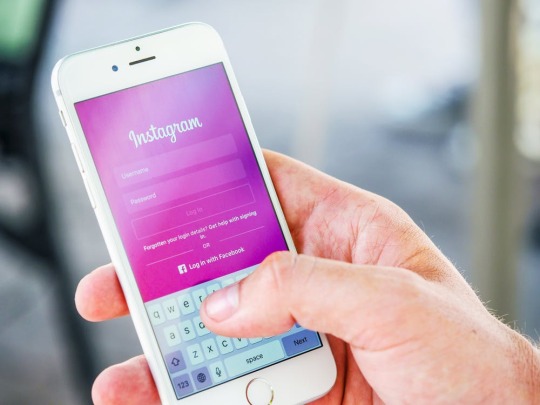
I feel like when I pick up my phone and mindlessly scroll I am by all means not saying to those I’m with that I’m uninterested in discussion, it’s just habit. Phones come everywhere we go – it’s like a fifth limb that we have all biologically developed in the 21stcentury. Science has truly gone crazy.
However, not only is it the barrier that using our phones poses, but also the expectation that the content that we see online poses. If you follow endless food accounts, it may make you feel guilty for eating any food that isn’t green and crunchy; if you follow lifestyle accounts it may make you feel like your relationship isn’t as healthy as it should be, that your partner isn’t taking you on dates as exotic and exiting as they should be; you may feel that your house isn’t as tidy and clean as it should be; you may feel like you’re not as toned and healthy as you should be; you may feel that your skin isn’t as fresh as it could be; you may feel that your job isn’t as exciting as it should be; you may feel that your weekend getaway isn’t extravagant enough; you may feel that…
STOP!
The pressure that we put on ourselves because of social media is immense. The culture that it creates is one of comparison – comparing every aspect of our lives and it isn’t healthy. It isn’t healthy for your body or mind. In Summer of 2016, 95 million posts were made daily to Instagram. That works out as 3,958,333 posts her hour, 65,972 posts a minute and 1,099 posts a second. It’s no wonder it feels like there’s no room to escape.
It’s important to take a moment to yourself and remember what really matters in life. Quality time with your family, your friends and yourself are essential to feeling at peace with the world. A book that has done me enormous favours is ‘Calm’ by Fearne Cotton (I have inserted the link to this book at the bottom of the this blog post). It has helped me to put things into perspective and to ‘let go’ of any issues or stresses I have that are out of my control.
Now, put your phone down, close your laptop and go and spend time with those who love you the most.
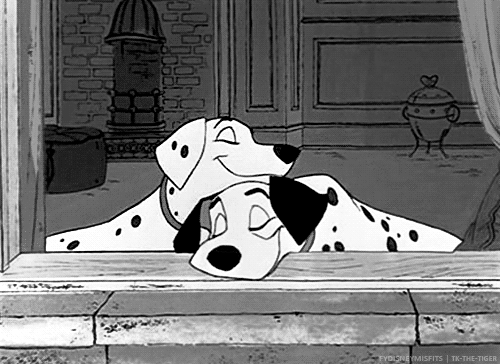
(https://www.amazon.co.uk/Calm-Working-through-stresses-peaceful/dp/1409183637/ref=sr_1_3?qid=1552217128&refinements=p_27%3AFearne+Cotton&s=books&sr=1-3)
7 notes
·
View notes
Text
From This Date
All too often people automatically assume that when referring to the past we mean weeks ago, months ago or even years ago. Consider yesterday’s past, consider this morning’s past and even your immediate past, five minutes ago. If I were to ask you what you did half an hour ago, what you did on Tuesday, or what you did two weeks ago, what would you answer? It’s easy to forget. Your brain can’t hold every detail unless asked specifically, but if you went through the data that your phone holds, I reckon you would remember almost every minute of your day.
Your phone collects data every time we pick it up, and even in between. Recently, I remember driving to my friend’s house and as I walked up to her front door my phone notified me of the traffic conditions and how long that it would take to get home. I was very confused over this as I have never once put into my phone where I live, yet it seemed to hold this data, and accurately so. I can only assume that it understood my return location to be my home due to the ratio of time that I spend there – data collected from continuously running location services.
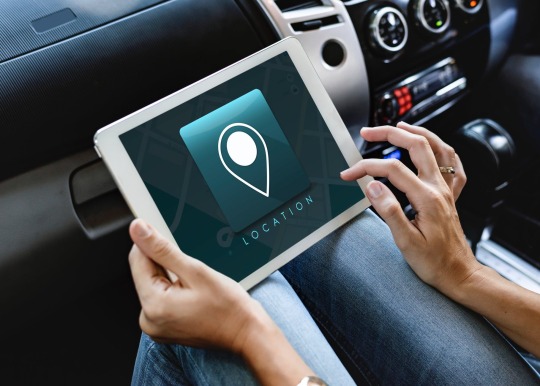
This service offers us great ease – we use applications based on our location, we can categorise our photos based on location and we can use the ‘Find my Friends’ feature. This feature is one that I both agree and disagree with: I think it is great where it enables parents or friends to keep tabs of where specific people are, without them having to physically be on their phone, a great safety feature. However, I also take the viewpoint that it is in fact an invasion of privacy. Yes, you can be selective in having the feature turned on or off, but for those to choose to have it on, you have never got a moment where you are not being tracked.
At times, I think we can all relate to just needing a break away from society. For me, going back home to Devon is often a small retreat allowing me to focus on whatever I choose, away from the busy life of university. But features such as these mean that there is never a moment that you are completely unattached from other people. Features similar to this have been copied and adapted onto more social platforms.
Snapchat maps, for example, mirrors this location feature where you can locate your friends down to the very street that they are on. Though I am aware of the invasion of privacy that this poses, it is the idea of not being involved that retracts me from turning this feature off, exposing over two hundred people to my location each time that I open the application. On my Snapchat, I only have people that I know, reassuring me that it is okay to have my location so readily available, but for those who are younger and may not understand the dangers of social media, their location could be available to complete and utter strangers who may have malicious intentions.

Not everyone online is truthful to their character. With the internet providing each and every one of us with so much freedom to be who we want to be online, it is no wonder that people take advantage of this to create a new social identity for themselves online. This concept can be referred to as ‘self-branding’ where users choose what aspects of their character they wish to display online.
Whereas previously your identity would vary based upon context so that your workplace would know you in a different light to how your family know you, likewise how your flatmates would know you, nowadays this identity could be argued to be the same across all communities of practice. You are likely to have everyone you know through university, family or work on your social media, so this will project one identity to each group.
Online, you have the ability to choose who you want to be. Some choose to refrain from exposing more personal details on their online platforms, yet others seem to overly expose information – information that would normally be kept to your closest friends or family. This culture of over-exposure could be linked to the trend of social media influencers that now circulates. Fame online used to be used for celebrities to show off their lifestyle, giving ordinary people an insight into how they live, but now it would seem that ordinary people can become an online influencer, should they wish to.
With this comes the need to build up a relationship with your audience, which explains the need to share every detail of one’s life, creating a more personal relationship which will draw users back to the online account to check-in on any updates on this person’s life; a person that they have usually never met. Ta-Da! We have the beginning of the social media influencer craze!
When you take a step back from this, you realise just how odd the concept is that people will spend hours of their day seeing what other people get up to in their life. But this is exactly what draws people in; they get to have a taste of fame themselves – they have an audience that they need to impress. This can either lead to inspiring content showing the ins and outs of one’s life, or it can mean misleading information is presented in a bid to gain extra “likes” or followers. With the online world, it offers us all the freedom to post exactly what we choose. With the correct filter applied you can make an average cup of coffee look spectacular, you can make the weather you had on holiday look far from the dodgy reality that you experienced and you can make your selfie look perfectly ‘Instagrammable’ with the correct lighting.
The main point that I want to get across in this blog post is that too much value is put onto our phones and our social media. All too often, instead of appreciating that gorgeous sunset for ourselves, we whip out our phones to share it with all of our followers. I’m guilty of doing this exact thing myself: when I go out for a meal it is now a running joke in the family that I will take a photo of the food as soon as it arrives (as most people nowadays would) and my Mum will joke ‘Can I start eating my food now?’. This is not a habit I am proud of yet I can’t seem to stop. It sounds ridiculous, I know, but it’s habits that we all get into online.
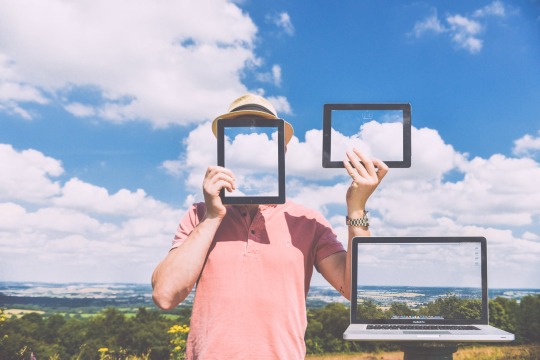
Perhaps these are habits that need to be broken. We all need to stop and live in the moment, seeing events unfold through our own two eyes and not through our phone screens. Less importance needs to be placed on our phones – why is it that I never seem to find myself going anywhere without my phone? It doesn’t pose a matter of life or death so why would I consider my phone one of my most valuable possessions?
From this date, I am going to make a conscious effort to appreciate things more for myself, without fulfilling the need to share that moment with others too.
From this date, how are you going to change the relationship that you have with your phone?
6 notes
·
View notes
Text
Is the Ability to ‘Swipe Right’ the New ‘I Do’?
In the modern day, our phones carry everything for us – they carry everything from our weekly schedules in our calendar, right the way through to precious photographs from times long ago; they carry our group chats that cannot be explained, but also our most in depth conversations with our best of friends; they carry the messages of romance between a past lover, soon replaced with the flirtatious messages from a new potential.
As we approach Valentine’s Day (a lonely time of year for many), it has forced me to consider the relationships that we seek with people online. Come Thursday, restaurants will be overflowing with couples sharing a romantic, candle lit meal for two over a glass of luxury wine. For others, come Thursday, it will be a time of year where they feel alone – yes, we all joke about it and we all celebrate ‘galentines’ with the women we love and appreciate in our lives, but when all of your friends around you are coupling up and finding ‘the one’, it’s bound to leave people with a feeling of self-doubt.
Without a significant other in one’s life, providing that feeling of love and care, people may turn to other methods to seek this feeling. Social media is known to provide users with a feeling of addiction, all thanks to the lovely chemical that we call dopamine. When we post a photo, the positive response that it receives feels great. Subconsciously, this is a feeling that we desire, we want more of it.
Where better to seek this feeling than the marvellous world wide web? All it takes is a few taps of your phone screen and the likes of Tinder, Bumble or any other dating app appear. Add in a few personal details and photos showing your best side, then you’re all set.
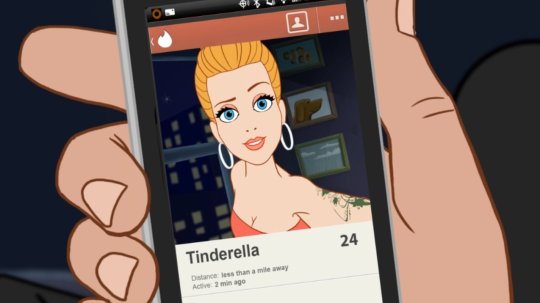
Years ago, the concept of meeting your significant other online wouldn’t have even been considered to be possible, the connection you make with someone IRL surely isn’t able to be replicated online? Well, it turns out that maybe it is.
According to Match.com, the most active time of year for online dating is from December 26th, to February 14th. Is this any surprise? We all know that feeling of being grilled at the family dinner table where we have to admit to our lack of a romance-filled love life, perhaps a sensitive subject, so where do we head to make ourselves feel better for this? Dating websites! With the build-up to Valentine’s Day and the pressure to have someone to shower you in gifts and chocolate, it’s no wonder that this is the busiest time of year.
The question I want to ask is what do we realistically gain from this? True happiness? A future husband-to-be? I know of a few people who have been happily coupled up for years and when you ask how they met, their answer is ‘through Tinder’, or ‘they slid into my DMs’ followed by laughter. Is this really the answer we want to give to our children when they ask how we met? Personally, it’s a ‘no’ from me.
This idea of meeting the love of your life whilst scrolling mindlessly through dating profiles is not one filled with romance. The cheesy chat up lines used are often enough for me to ‘unmatch’ them before even offering them a chance to fully introduce themselves – harsh, I know, but when there is no emotional connection it doesn’t leave any change to my life.
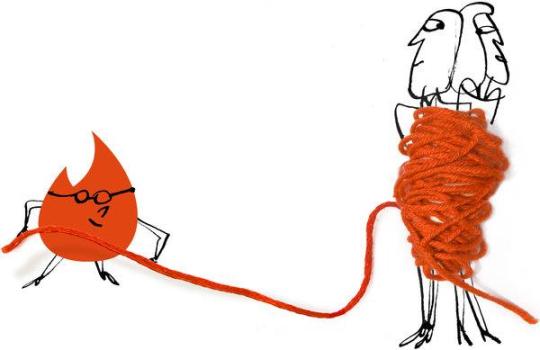
Social media now dominates almost every aspect of our life but should there be limits on how far we let it control our relationships? It is a daily ritual that can prove to be quite toxic – seeing your bf/gf like an ex’s post on Instagram, seeing them message someone that upsets you, seeing them spend too much time on their phone and not with you – it can all lead to the beginning of the end of a relationship.
So, why when we see the damage that social media can do to relationships, do we seek a relationship on the same platform? Social media is great where it allows us to communicate, share photos and interact with others when we are not in their company, but is this the right place to be seeking love? Potentially not, but maybe it will be – as trends come and go we will soon see the long-term impact that online dating apps have on our personal relationships.
14 notes
·
View notes
Text
The Dream Come True
Close your eyes and imagine.
Imagine rolling over in bed as your tiresome alarm goes off, resisting the urge to hit the ‘Snooze’ button. Instead of seeing notifications from the group chat of last night’s antics or Snapchats from the usual suspects, you see your name tagged countless times in videos on Twitter, on Facebook and…YouTube?!
In a rush of anticipation to see what all the commotion is about, you open Twitter – 15,000 retweets of the video with you in it?! You open Facebook –
‘hahahaha no way! you have to see this’
‘CREASING’
‘this will be you on Friday loool’
‘What a guy!!!’
– all comments from total strangers. Is this the moment you’ve been waiting for? Has the internet brought you a new-found fame?
You walk to your lecture, an extra stride in your step. People are looking at you, pointing at you, muttering to their friends. Feels weird, right? Your phone continues to go crazy – notifications impossible to keep up with.
You bump into the girl that you sit with in lectures on the way. ‘Have you seen the video?’ she asks – have you seen the video? Who’s she kidding? Of course you have, everyone has.
A message appears from an official page on Instagram, oh, and Twitter by the looks of it – get in! You’ve made it – everyone knows your name, everyone’s talking about you! You’re FAMOUS!
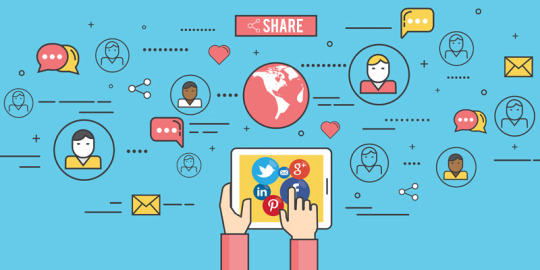
…
A few weeks later and you’ve lost some of your closest friends, you’ve had to leave your job and your parents can’t help but hide their disappointment.
But it’s okay because you’ve been signed up to represent some of the most up and coming brands on your social media, your name is known by all, and you’ve met celebrities that you would only dream about meeting. They were rude and dismissive of you, but that doesn’t matter because you can now brag that you’ve met them, can’t you?
Your degree has taken a back-seat because your schedule is too busy going to meetings in dodgy offices to discuss future plans with brands, but it’s okay because this is just the start and you’ll be in shiny London offices, maybe even LA before you know it – right?
You get paid for posting on Instagram, something you’ve always wanted! The extra monthly income is worth the trolls’ negative comments; they’re just jealous, aren’t they?
You have SUCH a cool new group of friends who take you to fancy restaurants and trendy clubs…but you miss your old friends. You miss the way you used to belly-laugh with them. You miss the memories you had together. You miss being able to be silly without being judged.
You miss the way your life used to be.
Is fame really worth it? Today we see virality touching all of our lives – for most, we see the new videos or memes trending online and have a good laugh with our friends. We tag each other, we join in on silly challenges like the ice-bucket challenge, the cinnamon challenge, or the puberty challenge. It’s all for entertainment. In some circumstances though, virality is not so entertaining...
Trolls are a far darker side to the internet. They can expose, criticise and mock others, to the point of utter humiliation. ‘Doxing’ is the term used to refer to this over-sharing online of confidential content. Once something is online, they say that it is almost impossible to permanently delete - chances are someone, somewhere has made a copy, or shared it on already, meaning that you have to think twice before sharing your content onto the world-wide web.
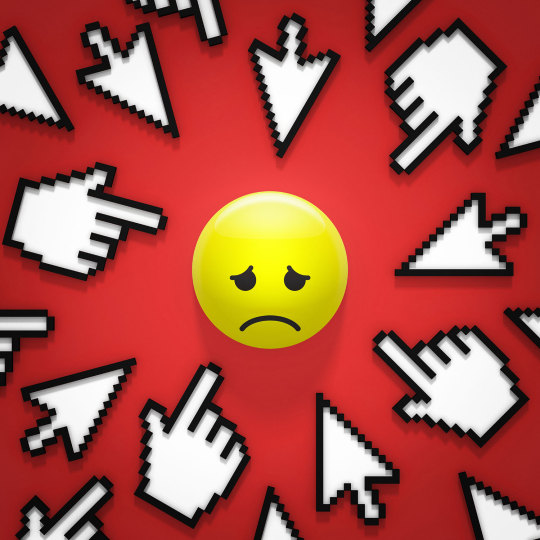
The international use of the internet can be the dream to people who seek fame, to those who need a wide platform to share their content on, or to those who wish to influence others. This is seen as the easy way to fame – break the internet and the world is yours. Opportunities will be thrown your way, opportunities that you never thought possible. However, the internet can also be regarded as a nightmare. For those who fall victim to trolling, to those who have their content over exposed, or to those who are sold the life of fame under false pretences. The egg that recently broke the world record for the most-liked photo on Instagram, beating the social media Queen of Kylie Jenner herself, is proof of the damage that fame can do.
On @world_record_egg’s initial post, it currently has 52,555,702 likes on Instagram. This number will continue to increase, though at a slower pace to previously, where it went viral internationally in such a small matter of time. A few posts later and the egg had cracked – the pressure became too much and the egg broke. Though at first this idea was simply a trend for everyone to jump onto in an act against the Kardashian clan, or simply a trend to jump onto the back of, it was in fact an act for raising awareness about the mental health effects that social media can pose.
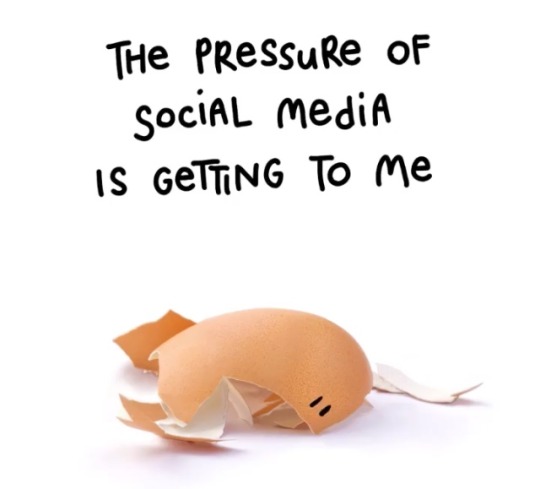
Fame may seem like the best option: having your name known to all, having every aspect of your life paid for you, having the supposed ‘perfect’ lifestyle, but people need to stop wanting what they don’t have.
Take a moment to appreciate your friends and family around you, take a moment to appreciate the life that you live and spend one less moment on your phone because at the end of the day, phones are disposable.
Your life is not.
4 notes
·
View notes
Text
To Love, or To Hate?
How easy do our phones make our daily lives? How much knowledge do they provide us with? How remarkable is the interconnectivity they provide us with? How many seconds does it take to order that outfit for the weekend? How many options do you have doing your weekly food shop? How convenient is it to have an Uber at the click of your finger?
HOW do we have access to all of this in the palm of our hand?
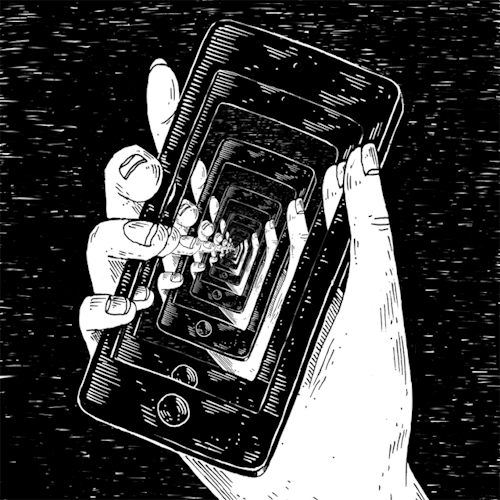
Since the first ever printing press in the fifteenth century, communication methods have seen a break-through. Globalisation has called for advancements and the world has answered, more than one could ever have imagined. When you really think about it, the fact that with a few taps of a glass screen we can find out any answer to any question that we desire, it is unbelievable.
I once met a customer at work who’s encounter seems to have stuck with me six months on. She was an intriguing character but she fascinated me. She was a friendly face, seemingly stuck in her own bubble – content nonetheless. She had found the comfiest seating that we had outside in the courtyard area, overlooking the sea and as I delivered her elderflower bubbly to her table, I queried about the book that she was so thoroughly engaged in:
Magic.
The book was about magic. She then asked me what my concept of magic was: a wand, fancy tricks to make everyone go ‘Wow!’, a bunch of flowers appearing from a sleeve – the usual. I returned the question and her answer was not one that I would have expected. Her answer was that of ‘technology’.
She struck me as a character who wasn’t overly familiar with the likes of Facebook, Facetime or the latest Apple products, but she had a lot to say on the matter, opening my eyes to a perspective that I hadn’t yet considered. We continued to have a lengthy discussion on how the real magic in the world is right in our hands yet we cease to acknowledge this…We all have access to it, we all use it, but do we know how it works? No, we don’t. We all accept it because everyone else does. We don’t question how, because someone else will know the answer so we know it’s safe, we know it’s okay.
But why when a magician performs a trick do we become mesmerised in wanting to know how the magician predicted our answer, or how they escaped from a box they were trapped in?
So I am asking this now: why don’t we get caught up in how our phones can predict everything for us? Why do we feel trapped in our phones, the endless cycle of social media, yet we can’t escape it? Technology is an addiction and addictions have consequences.
I think that it is important to consider how much we can trust our phones and how much private information we share. Companies use algorithms online to provide you with exactly what you want to see. The latest information that shocked me was the concept that our phones listen to our conversations – low and behold I now firmly believe this speculation. One evening I was deciding with my flatmates about what to cook for dinner with the few ingredients that I had in in fridge (student life – sigh!), and there I was half an hour later scrolling through my Instagram feed and sponsored advertisements appear, containing images of the foods that I has listed. I have mentioned needing new shoes– adverts for high heels appear. I have mentioned upcoming holidays that my friends and I have planned, and there they are – advertisements for the cheapest places to stay. How do they then know that I need cheap places and am not looking for deluxe hotels? Have they gathered information from across my phone’s data and have concluded that I am on a student budget? I wouldn’t be surprised.
I know that this won’t change the way that you use your phone, or the amount that you rely on your phone – we all do. The technology that we own is an accepted part of our life that we don’t waste time to question. The purpose of this blog post is simply to provide you with food for thought – should the relationship that we have with our phone be one of love, or one of hate?
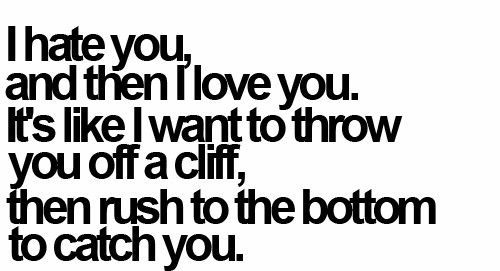
7 notes
·
View notes
Text
Should We Take Instagram Influencers at Face Value?
A topic that raises many questions for debate in this day and age is the impact of Instagram influencers on the younger generation. Without a doubt, influencers are an ever-growing trend, helping to mould one’s experience on the social media app. There are a countless number of themes that influencers may choose to follow: from travel, to food, to fashion, to fitness; there is a space for almost anything on this platform. They can provide inspiration to their millions of followers, creating awareness of new products on the market, or providing motivational messages themselves that circulate in their own trends through the use of hashtags. This both enables their reach to expand for their own benefit, at the same time as making their content easier to locate on a platform where thousands of people post similar material. However, a hashtag that has only recently emerged is that of ‘#ad’. As of 2017, any influencer that had been paid to promote a product must use this hashtag to make their followers aware that this may not be their own beliefs on the product, but a belief that they are paid to drive.
With the introduction of this hashtag comes more than the #ad itself. It also raises the question as to why this was necessary to introduce in the first place. Celebrities have not held back in calling out certain mainstream influencers who are not unknown to promote dangerous products. Jameela Jamil has unashamedly named numerous celebrities who are known to advertise diet teas and teas that are designed to help you lose weight, when in fact they simply act as a laxative. The Kardashians also have posted about a significant amount of products that act as an appetite suppressant, notably Kim Kardashian’s post where she posed with a lollipop in a somewhat seductive position with the caption quoting ‘They’re Appetite Suppressing Lollipops and they’re literally unreal’. The backlash from this was enormous, with the removal of the post consequently.
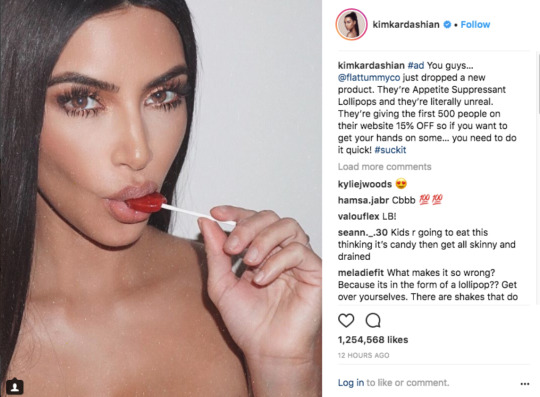
This is where it’s difficult to draw the line because #ad had in fact been used on this post, alerting her followers to the fact that she was being paid, but the content was still so heavily disapproved of. As much as there is the argument that it is their social media and they have the right to post as they please, there is also the argument that influencers shouldn’t allow themselves to take money from a business that promotes products that are damaging to one’s health. The millennial generation, as mentioned in my previous blog post, is one of the heaviest users of Instagram – at an age where they will easily be swayed to buy into a toxic product if they see others doing so.
One could argue that Instagram itself could in fact be the ‘toxic product’. In theory, the platform is a fantastic way of sharing our lives, but when it is so heavily dominated by influencers it is changing the way that people, particularly young people, think. This doesn’t stop at Instagram influencers, but also reality stars on programmes such as Love Island or Big Brother. Young teenagers are losing all sense of ambition, with a startling number wishing to grow up and become a YouTuber. They have grown up seeing users make their living through their new-found fame. On many television shows the audience see ordinary people become superstars, with every aspect of their life being sponsored by international brands – it’s no wonder that kids have this dream. In 2018, there were more applications for Love Island than there were for Oxford and Cambridge University, combined. The need to achieve the highest grades possible isn’t always seen as a necessity nowadays, where there is the impression that anyone can become an online influencer if they wish to do so.
This having been said, the positive side to influencers mustn’t be forgotten. There is an increasing number who recognise this danger of over-exposure on Instagram, so go out of their way to post body-positive images to show their followers that not every aspect of their life is filled with glamour. However, a practice that many influencers have been noted to latch onto is that of ‘sadfishing’. This is where they will post a caption to their photo that on surface level is them ‘opening up’ to their followers, talking about an incident where they have been hurt or about a ground-breaking opportunity that they have coming up, but failing to elaborate. This gives the initial impression that they are real people and all credit goes to them for taking a step back from the limelight for those few moments where they sit on the sofa to upload their post, but in actual fact this is a technique that has been caught onto where they will make more money by gaining extra ‘likes’ or comments for sympathy.
As a user of Instagram, one should be aware of the fact that not everything they see is as truthful as it may seem at face value. An extreme example of this is the ‘Fyre Festival’ scandal that has recently resurfaced with the new Netflix documentary. Celebrities who could be deemed to be some of the greatest international stars were paid up to $250,000 to post one photo, a plain orange tile, to promote this out of this world experience in the Bahamas – one that never happened. The dream that was sold turned out to be a lie, most of their marketing being on the platform of Instagram.
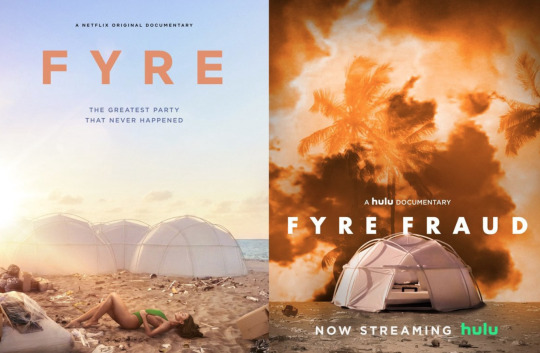
A bubble of ignorance to what one sees online can form easily if one allows it to. Instagram is what you make of it. I think that a greater awareness should be given to the need to pro-actively search for information that isn’t given to you instantly on your phone screen. I, myself feel that I need to break free from a circle of watching endless fitness videos and diet plans. I recognise that it isn’t healthy, so why do I continue to do so? I think a question that we all need to ask ourselves is ‘what do we benefit from seeing this content?’. Reflect on what you expose yourself to daily and if it only makes you feel belittled, or that living your own unique life isn’t enough, simply unfollow that account. See what change you notice in your life when you actively seek to remove all negativity. A little bit more self-love is needed in a world where there is always pressure to be better. Strive to be the best version of yourself that you can be, but be content along the journey that it takes to get there. Stop comparing your life to the lives of others that you see online.
7 notes
·
View notes
Text
Should We Consider Those Who Don’t Use Instagram as ‘Antisocial’?
With its ever-increasing popularity, Instagram is now considered one of the most popular forms of social media, with women aged 15-24 being named the greatest category of users in 2017*. It is one of the largest platforms to share photos and videos of each other’s lives, with the ability to approve posts with a simple ‘like’, or a comment of support. This allows an insight into the lives of those whom we follow, from an angle or perspective that perhaps we don’t see in real life, creating the desire to show only the successes or highlights of our lives. Instagram is a means to create an online identity that we wish others to see – it is rare to see a post from an account where they share their worst angles, their routine working-life or their hangover from hell. Instead, they will post their best angles showing off their new gym kit (all the gear and no idea? Instagram will keep you keep guessing); that time that they were topping up their tan on a beach in Majorca; or a photo of their fry-up at a cafe, captioned ‘hangover cure’, failing to display the killer side to a hangover that we all know.

With this expectation to present the idea that we all live a perfect life, is it any wonder that some people take the pro-active decision to take themselves away from Instagram? At times, this pressure can feel like too much to live up to, so rather than naming those who choose to take a step back as ‘antisocial’, I feel the more appropriate term would be responsible – responsibility is being taken for their own well-being. The relentless scrolling through Instagram, often mindlessly, can be toxic if there is too much exposure to topics that could be considered triggering.
Girls will often follow accounts belonging to models, actresses and celebrities. These people are constantly exposed to the public eye, so it’s no wonder that they present themselves in a certain way, often unrealistically. They will have make-up artists, personal hair stylists and photographers to capture the glamour of their life, all of which is usually unachievable for the everyday girl. Endless accounts belong to models who appear to live the dream, prancing around on golden beaches in the tiniest bikinis, drinking cocktails under the sunset. This is a dangerous perception for girls to grow up with seeing and believing that this is the reality – young women are still learning who they are, their ideas of perfection changing and adapting based on influences in their life. An exposure to unrealistically beautiful women can lead to a longing to be like them which can provoke the sensitive issue of body image.
Eating disorders can be linked to the material many women see on Instagram, with thousands, if not millions, of accounts demonstrating diet plans or fitness programmes. If used for the correct reasons, these accounts can be inspiring, particularly at a time we are all working on our New Year’s resolutions. However, all too often these accounts are used for the wrong reason and will only encourage a developing disorder.
So, with this having been said, no it is not antisocial to stay clear of Instagram. The awareness of the dangers of this social media platform is becoming greater by the day with social media influencers standing out against the unrealistic life that many choose to live online. Olivia Bowen recently posted on her Instagram story a highly credible video of herself in her sports bra and leggings, demonstrating to her 1.9 million followers that all it takes to get a successful photo is a good angle and posture. She is not alone in posting videos of this content, with Alexandra Cane posting a similar message.

These women have been watched on television for six weeks of the year, over summer – a time when people are possibly feeling the most body-conscious that they could due to the social pressure of having a ‘bikini body’. The fact that it is these women, whom many admire and look up to giving out this message, it provides hope that young women’s attitudes to body image and living up to the social expectations to be ‘perfect’ are changing for the better.
*Statista (2019 ) Instagram usage in Great Britain (GB) as of May 2017, by age and gender. Accessed from: https://www.statista.com/statistics/536697/instagram-usage-in-uk-by-age-and-gender/ on 16.01.19.
8 notes
·
View notes